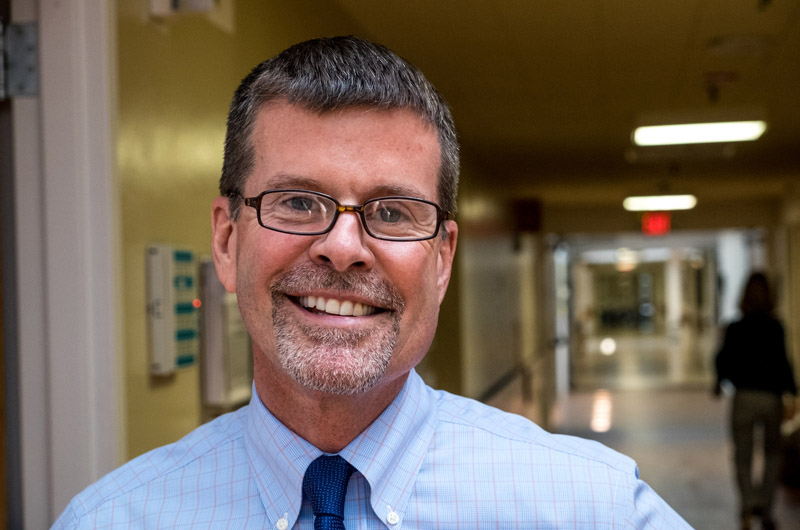The few miles of water between the Island and the mainland is a comfort of sorts for new Martha’s Vineyard Hospital president and chief executive officer Joe Woodin. While it presents unique challenges, the isolation also provides unique advantages. He finds people here invested in their hospital, and he expects that to help him lead the facility through challenging times in the world of health care.
Mr. Woodin arrived in May to succeed Timothy Walsh, who retired after 16 years at the hospital. He comes from Gifford Hospital in Randolph, Vt., where he was president of the rural medical facility.
He said he was happy in his job, but after his wife died of cancer, he began to wonder if change was in order.
“We were married 27 years, life was good,” he said. “I was just going to stay there.”
Several other life events, some expected, some unexpected nudged his wonder forward. With two of his children out on their own, and a third enrolled in college, he came to believe it was time to move on.
“I sort of felt I was being pushed, if not drawn to do something different,” Mr. Woodin said. “This is the one time and one position I’m going to look at.”
As fate would have it, after an extensive executive search, the hospital board of directors said Mr. Woodin was a clear choice.
Originally from Framingham, educated at the University of Massachusetts and St. Michael’s College, he began his career as a manufacturing engineer, first at a company that produced wire, then with a health care facility in Vermont.
He described growing up in modest circumstances. A Vineyard vacation was only a few miles away, but beyond the reach of his large family.
“We used to go to York, Me., maybe once a year, with all the kids.”
While on the surface the Vineyard seemed an unlikely destination, he landed in a place that was remarkably similar to his previous job. He noted parallel experiences between him and his predecessor.
Mr. Walsh began his tenure at the Martha’s Vineyard Hospital in 2000, the same year that Mr. Woodin began at Gifford Hospital.
Both joined facilities with deep financial difficulties, and both had undergone multiple leadership changes in a short period of time. Both facilities had an attached nursing home that lost money. Both men are credited with turning around dire finances, improving quality and bringing stability to their hospitals. Both also earned wide admiration from their communities.
In a short time, Mr. Woodin has established a low key, participatory approach to managing the Vineyard hospital.
“The first priority is for me to understand and listen and certainly appreciate what is in place,” he said. “There are a lot of great assets and programs and positive things going on in this organization. My job is to not make the mistake of changing things that are working really well. I try not to lead with my personality. It shouldn’t come down to just the leader’s opinion. Everybody has a hand in the success.”
He does not underestimate the challenges ahead. He described a three-pronged approach to health care: quality, access and cost.
“There’s always an interest in improving quality, there’s always a need to provide better access so everybody’s covered. But out of those three, probably the biggest one that has driven Americans’ concern is the cost of health care. That has continued, will continue, regardless of which president is elected. To put more pressure on the system to drive down the cost of health care, is probably very appropriate and necessary.” Mr. Woodin takes the helm of the Island’s only hospital during an ongoing opioid epidemic, and an ongoing, sometimes contentious debate over whether the hospital should establish a medical detox unit.
He said a committee of hospital staffers is working on an Islandwide effort to assess services and strategies to address the heroin crisis.
“The detox bed issue seems to have risen to some level where people think that is the most important next step,” he said. “It’s a piece, but detox beds carry some very significant regulatory requirements. It’s really much more
complicated than to merely put in a couple of detox beds. At this point, it doesn’t look like a viable alternative, and it’s not just because of the cost.”
He said Windemere Nursing Home will always be a challenge, financially.
“It’s tough to have that in front of you, that we have an organization that loses quite a bit of money,” he said. “If you’re committed to providing consistently good, high quality care, there’s a cost to that. I think it’s nice that we try to invest and reinvest all of our resources and time and effort to provide great care. To say we’re going to break even and start to make a small margin on the nursing home, I’m not sure that’s going to be possible. Fortunately we have a team here. The hospital and Windemere are a team, and we get to help each other out.”
He said the Island community has been welcoming, and he is happy in his new home and new job.
“The Vineyard is very cloistered, as an island,” Mr. Woodin said. “I think there’s a beauty to that. I think we have great support from the public. That’s different from the mainland, where there’s a lot more competition. Dare I say, it’s a lot more cutthroat? It’s nice that the community does genuinely support the hospital, and want it to be successful. Not all communities have that.”








Comments (3)
Comments
Comment policy »